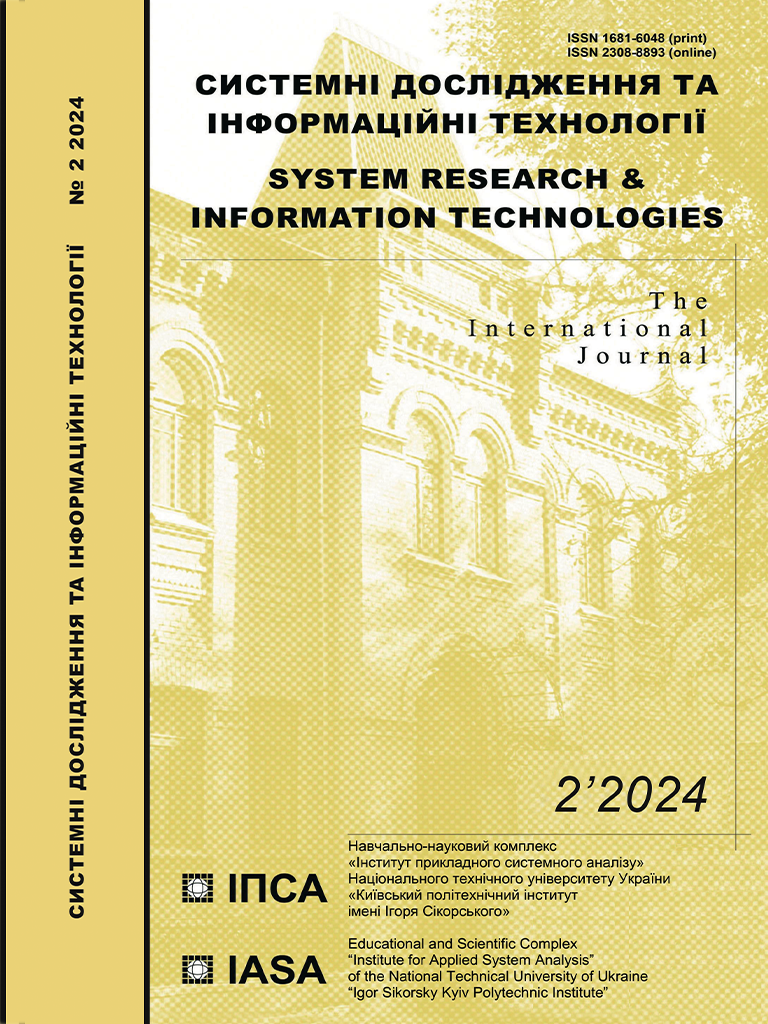An improved approach to organising mobile edge computing in a 5G network
DOI:
https://doi.org/10.20535/SRIT.2308-8893.2024.2.06Keywords:
5G network, mobile edge computing, task allocation scheme, call flow, load balancing, task verificationAbstract
Mobile edge computing is an important element in ensuring the efficiency of the 5G network as a whole, as it enables data storage and computing at the network edge. Existing solutions do not fully address the issues of load distribution between computing nodes, and most solutions do not offer methods for verifying computations and controlling errors. Accordingly, this paper aims to develop an approach to the organization of mobile edge computing in a 5G mobile network that would authenticate distribution servers and computing nodes, manage the process of distributing computing nodes, have a procedure for verifying the correctness of calculations, and take into account the parameters of computing nodes during distribution. To achieve this goal, we propose to use the developed method. The method of load balancing and selection of computing nodes for edge computing via 5G allows for identifying available nodes and distributing computing blocks among them. It also provides mutual authentication of elements and includes a method of data verification and error detection for the MEC system. The provided solution allows for controlling errors during calculations and protecting the server from incorrect data. These methods are optimized according to minimum network resources and computing time criteria. These improvements increase the efficiency of mobile edge computing in a 5G network.
References
F. Vhora, J. Gandhi, “A Comprehensive Survey on Mobile Edge Computing: Challenges, Tools, Applications,” 2020 Fourth International Conference on Computing Methodologies and Communication (ICCMC), Erode, India, 2020, pp. 49–55. doi: 10.1109/ICCMC48092.2020.ICCMC-0009
S.S.D. Ali, H. Ping Zhao, and H. Kim, “Mobile Edge Computing: A Promising Paradigm for Future Communication Systems,” TENCON 2018 - 2018 IEEE Region 10 Conference, Jeju, Korea (South), 2018, pp. 1183–1187. doi: 10.1109/TENCON.2018.8650169
L.A. Haibeh, M.C.E. Yagoub, and A. Jarray, “A Survey on Mobile Edge Computing Infrastructure: Design, Resource Management, and Optimization Approaches,” in IEEE Access, vol. 10, pp. 27591–27610, 2022. doi: 10.1109/ACCESS.2022.3152787
D. Liu, A. Hafid, and L. Khoukhi, “Workload Balancing in Mobile Edge Computing for Internet of Things: A Population Game Approach,” in IEEE Transactions on Network Science and Engineering, vol. 9, no. 3, pp. 1726–1739, 1 May-June 2022. doi: 10.1109/TNSE.2022.3150755
W. Zhang, G. Zhang, and S. Mao, “Joint Parallel Offloading and Load Balancing for Cooperative-MEC Systems With Delay Constraints,” in IEEE Transactions on Vehicular Technology, vol. 71, no. 4, pp. 4249–4263, April 2022. doi: 10.1109/TVT.2022.3143425
J. Ren et al., “An Efficient Two-Layer Task Offloading Scheme for MEC System with Multiple Services Providers,” IEEE INFOCOM 2022 - IEEE Conference on Computer Communications, London, United Kingdom, 2022, pp. 1519–1528. doi: 10.1109/INFOCOM48880.2022.9796843
W. Zhang, W. Fan, G. Zhang, and S. Mao, “Learning-based joint service caching and load balancing for MEC blockchain networks,” in China Communications, vol. 20, no. 1, pp. 125–139, Jan. 2023. doi: 10.23919/JCC.2023.01.011
H. Wu, L. Chen, C. Shen, W. Wen, and J. Xu, “Online Geographical Load Balancing for Energy-Harvesting Mobile Edge Computing,” 2018 IEEE International Conference on Communications (ICC), Kansas City, MO, USA, 2018, pp. 1–6. doi: 10.1109/ICC.2018.8422299
“The Radio Access Network and its resource allocation method calculated based on mixing fog,” Patent App. CN108243245A, 2020.
Debashish Purkayastha, Xavier De Foy, Robert G. Gazda, “Systems and methods to create slices at a cell edge to provide computing services,” Patent App. WO2018089417A1.
“Resource allocation methods based on mobile edge calculations,” Patent App. CN109041130A, 2021.
“A kind of data distribution method based on MEC auxiliary in 5G networks,” Patent App. CN108174421A, 2020.
“A kind of edge calculations method for 5G super-intensive networking scenes,” Patent App. CN107333267A, 2019.
“A kind of 5G method of mobile communication and system based on MEC and layering SDN,” Patent App. CN107404733A, 2020.
John Juha Antero Rasanen, Pekka Kuure, “Method and apparatus for implementing mobile edge application session connectivity and mobility,” US Patent App. US16/072,901 (US 2019/0045409 A1).
Mehran Moshfeghi, “System and method for discount deal referral and reward sharing,” US Patent App. US13/484,261 (US20120316939A1).
Willem Jacobus van Niekerk, Marc van Niekerk, Brendon van Niekerk, Ernst Kleinhans, “Method and system for online redistribution of data and rewards,” US Patent App. US15/464,934 (US20170255981A1).
Dennis Detwiller, Robert Sparks, “Rewarding Users for Sharing Digital Content,” US Patent App. US13/106,716 (US20120290308A1).
Pavel Mach, Zdenek Becvar, Mobile Edge Computing: A Survey on Architecture and Computation Offloading. Available: https://arxiv.org/abs/1702.05309
Q.V. Pham et al., “A Survey of Multi-Access Edge Computing in 5G and Beyond: Fundamentals, Technology Integration, and State-of-the-Art,” IEEE Access, 2020. doi: https://doi.org/10.1109/ACCESS.2020.3001277

